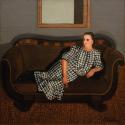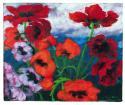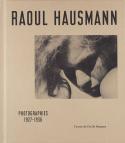Art Of The Day Weekly
#502 - from 15 February 2018 to 21 February 2018
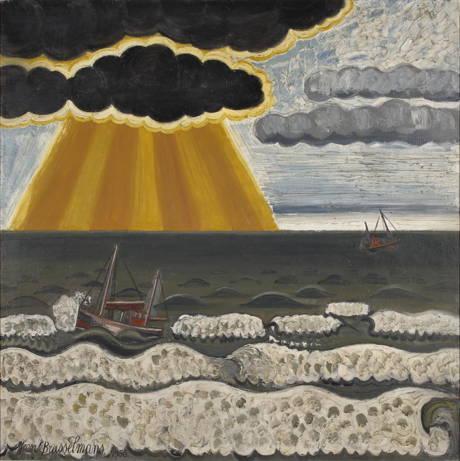
Jean Brusselmans, The Storm, 1936, oil on canvas, 147 x 147 cm, private collection (exhibition at the Gemeentemuseum, The Hague).
IN THE AIR
Painters of the North
Who doesn’t fall under the charm of the snow, of boreal lights, of the frost that gently places its lace on the leafless branches? We all witnessed it this week as Paris woke up under a white blanket. And we appreciate it even more as it does not last long: we can already see the first blossoms on branches. Paintings are like the seasons: each one has its hour of glory and its amateurs. The Northern schools and their great techniques, in particular the invention of oil painting, cover very different realities, from Van Eyck to Van Gogh, from Cranach to Munch. At the end of the winter, here are a few exhibitions that bring them on the front of the stage.
EXHIBITIONS
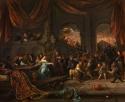
Jan Steen, The Mocking of Samson, c.1675-1676, canvas, 65 x 82 cm, Royal Museum of Fine Arts Antwerp (KMSKA), Antwerp.
Another Steen
THE HAGUE - Jan Steen seems to rhyme with a painting style that is joyful and popular, tavern scenes that are a little rude, smoking parlors inhabited by picturesque and original faces. Strangely though, the uniform vision today’s museums give us is not the one observed after his death. This crude Dutch painter used to be appreciated in his time as a painter of religious and mythological scenes. The exhibition explores this reversal of the way of looking, as it shows various Lot, more than one Moses, while it takes the opportunity to attribute to the master of Leyden a painting from the museum of Antwerp. Until now this Samson Mocked by the Philistines was thought to be the work of one of his disciples of the 18th century: but technical analysis unveiled in particular a specific green pigment which is found in the master’s other works.
• Jan Steen’s Histories, at the Mauritshuis, from 15 February to 13 May 2018.
Brusselmans, reflects of provincial life
THE HAGUE – He is one of the artists forgotten by Belgian and European painting in the first half of the 20th century. Jean Brusselmans (1884-1953), in spite of being the colleague of Rik Wouters, never equaled his celebrity. This may be due to an overly sedentary life, in his little town in the Brabant region, to his preference for the simple scenes in daily life, to his refusal to be wrapped up in one of the “isms” of his time, in particular Flemish expressionism? Bucolic landscapes, fishing scenes, the interiors of ordinary people’s homes, the rhythm of the seasons: his universe is both limited and universal.
• Jean Brusselmans, my Flemish Fatherland at the Gemeentemuseum, from 18 February to 10 June 2018.
Nolde, a man of colors
DUBLIN - Emil Nolde (1867-1956) is still seen as a strange figure in the German artistic landscape in the period between the two World Wars. In spite of the fact the Nazis considered him as degenerate, he nevertheless tried to get his party membership a number of times. He stayed in Germany, where he lived isolated from others. He developed a bright and colorful world, which he splashed on his watercolors, which he called “non-painted images”. They form a choice piece that tries to repeat the success of the retrospective dedicated to another painter of the North, his friend Munch, in 2009. While the exhibition covers his whole career, it is particularly rich in works on the vibrant period of the 1910 and 1920s, with his portraits, his women, his couples, when the artist was torn between a difficult empathy for society (he lived in Berlin), and the wish to flee everything, which he finally did do by leaving to Siberia and then to the Southern seas. We are told not to hesitate to see twice an exhibition. The date will be important in this case, as all the works on paper will be replaced half way into the exhibition.
• Emil Nolde: Colour is Life at the National Gallery of Ireland, from 14 February to 10 June 2018.
BOOKS
Hausmann, a dormant Europe
He was born in one of Europe’s capital, Vienna, in 1886. He was one of the stars of the Dada movement in Berlin, the inventor of photomontage, the great friend of Moholy-Nagy, who would have loved to have him come to the New Bauhaus in Chicago to have him discover the new world and have the latter discover his value to this New World. Yet, when Raoul Hausmann died in 1971, at the antipodes of this Europe of the avant-gardes, in the depths of the French province that hid him during the war, in the region of Limoges. His burial was attended by a handful of persons, among them Claude Viallat. The exhibition at the Jeu de paume and this elegant square shaped catalogue unveil the intermediate period of the thirties. Faced with the rise of extremists, Hausmann cultivated his interior self, that is, photography. Nudes, portraits, flowers and fields, still lives and the cubic architecture of Ibiza, the mirage that attracted the outcasts of all types at the time, among them Walter Benjamin.
• Raoul Hausmann, photographies, 1927-1936, texts by Cécile Bargues, Le Point du Jour/Jeu de paume/Musée de Rochechouart, 264 p., €39.
OPENINGS OF THE WEEK

Patrizia Pic De Donno - Jean Pierre Avonts-Saint Lager
17 February 2018 - PARIS - Galerie du Montparnasse
Two artists who use underestimated materials - textiles, pearls, paillettes

